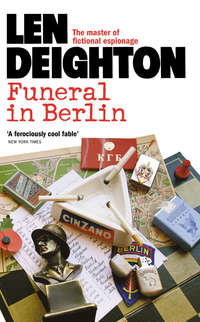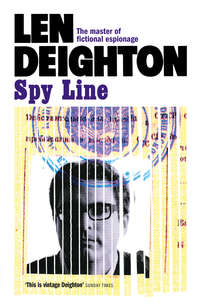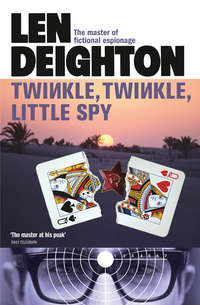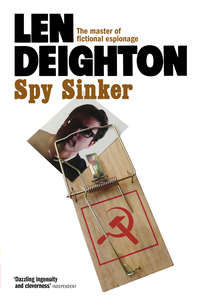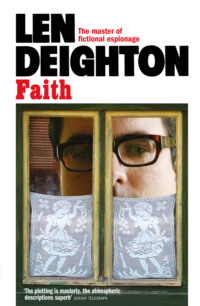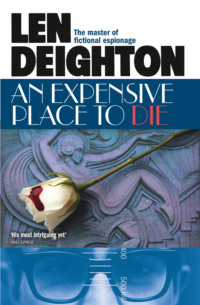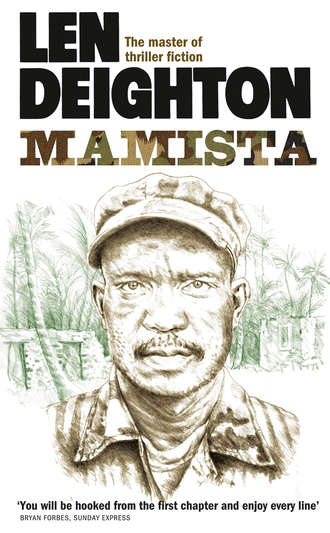
Полная версия
MAMista
But for many people in Tepilo the slums – and their rebel townships – did not exist. That side of town was not on the route to any of the good beaches or the swanky nightclubs. Even the people who had to drive that way used the elevated freeway that took them high above the barriada. Providing they kept the window closed, they didn’t even notice the stench that arose from it.
But Lucas didn’t keep his window closed. He looked down and saw the beggars and the diseased, the cripples and the starving. There were hollow-faced skeletons wrapped in rags and hungry babies that never stopped crying. Sprayed on the rusty iron sheets, and broken pieces of dockyard crates, were revolutionary slogans. Here and there flew a home-made flag, spared from precious cloth to signal their anger. It was too bewildering. Lucas looked away. On each side of him Cadillacs and Bentleys, Fords and Fiats raced past, no one sparing a glance for that netherworld.
When they reached the water the people strolling along Ocean Boulevard did not seem to worry about the people of the barriada. Neither did the shopkeepers in the cramped little alleys of Esmeralda where ramshackle slum tenements had been artfully transformed into a chic shopping district. Here the latest in Japanese video cameras, genuine furs of almost extinct carnivores and gold and enamel bracelets – ‘replicas of pre-historic Indian designs’ – could be bought tax-free for US dollars, Marks or Yen.
The cab stopped and Lucas got out at the statue of President Ramírez, ‘indomitable founder of Spanish Guiana’s freedom’. There was a smell of damaged fruit and vegetables. The market square was empty except for men rolling up the sun-blinds and stacking away the market stalls, and a couple of nuns picking through a heap of discarded produce.
The address he wanted was a callejón crowded with shoppers and tourists. Some had been taking photographs of the vegetable market. Some were coming and going between the much photographed statue and Tepilo’s notorious ‘sailor’s alley’, a dark little sidestreet of tiny bars, loud music and bright neon signs that had become a place where prostitutes plied their trade. Here were men, women and small children catering to all tastes. Other tourists were looking for the ‘silver alley’ where it was said noble families offered priceless antiques for discreet and immediate cash sale. Some wanted to see the military checkpoint that marked the extreme edge of the villa miseria that the guerrilleros were said to control.
Lucas made his way along the crowded alley, pushing through the pimps, beggars and salesmen who grabbed at his sleeve and jacket. The archway at number fifty-eight bore a painted sign, Gran Hotel Madrid. Lucas stepped over the outstretched legs of a sleeping doorkeeper. On the wall a sign made from shiny stick-on letters said ‘privado’. Lucas went past the sign and into a cobbled courtyard at the rear of an old three-storeyed building.
The sunlight in the courtyard was coloured green by a tree that reached higher than the roof. Around the courtyard fretwork wooden balconies jutted out at each level. Numbered doors indicated a collection of small dwellings. Everywhere there were big pots from which rubbery plants and glossy flowers came crawling up the rainwater pipes and hanging over the balconies. One would think a town perched on the edge of the jungle would have enough greenery without potted plants, thought Lucas. At ground level a black woman was emptying a pail of soapy water into the open drain. She stared at Lucas. This was not a hotel, nor a whorehouse, she told him. Lucas nodded amiably and she told him it was forbidden to take photographs here. He smiled. She stood arms akimbo and watched him ascend the narrow staircase to the third floor. She was still looking at him after he’d rung the doorbell and looked down over the balcony. He raised his hat.
From inside came the sound of a heavy bolt being drawn. The door opened a little and a man’s face appeared in the gap. It was not welcoming.
‘My name is Ralph Lucas.’
The man said nothing. Without haste he opened the door to allow Lucas inside, where Lucas noted the smell of cooking and, from somewhere nearby, the sound of a radio tuned to Spanish pop music. When the door was closed and bolted again, the hall became dark. Now the only light came from the dim bulb in a tiny plastic conch shell fixed to the ceiling.
The man pushed past Lucas, opened another door, and led the way into a room that faced the front of the building. It was bright and sunny, its window providing a view of the rooftops and the cathedral. The room was furnished like a study. There were shelves of books and a desk upon which pens, inks, pencils and a large sheet of pink blotting paper were neatly arranged. In the corner a small refrigerator whirred loudly. Propped in the corner alongside it stood a folding canvas bed. Lucas regarded the bed with interest and decided it was where he would probably sleep that night.
Another man was there: a slim tanned fellow, about twenty, with long wavy hair and steel-rimmed glasses. He wore jeans and scuffed tennis shoes. He seemed ill at ease and was toying with a glass of beer. Lucas guessed him to be another foreign visitor.
The man who had let him in was powerfully built, dark-skinned and about forty years old. He was wearing white trousers, now somewhat wrinkled, and a red-checked shirt. His face was marked with the sort of scars that prize fighters – and street fighters – sometimes flaunt. Such men often had the same large lumpy hands that this man had, but they seldom had fingernails missing.
Lucas guessed that he was a communist of the old style. The party liked men like this: battered Goliaths, diligent, humourless men who would provide bed and board to mysterious foreigners because some local party secretary – the girl no doubt – said it was for the cause.
While rummaging in the refrigerator, the elder man said his name was Chori and, still without turning, introduced the younger man as Angel Paz. Angel of Peace: it sounded an unlikely name to Lucas, but some parents liked weird names. So Lucas nodded to Angel Paz and gladly accepted the cold beer that Chori poured.
There was an awkward silence. The arrival of Lucas had interrupted them. Lucas could see that some sort of relationship existed between these two incongruous individuals. They were not homosexuals, he decided: perhaps it was a political secret. Communists needed secret conspiracy as fish need water.
‘Here we have no middle-class intelligentsia,’ said Chori, as if taking up a conversation that had been interrupted. ‘Or at least, very few.’ He waved his hands impatiently. ‘We are a workers’ movement. It is the workers who bring the revolution to the Indians and farmers in the south.’ He looked at Lucas as if inviting him to join the conversation.
Angel said, ‘Historically that is bad. Marx said there must be a middle-class intelligentsia to theorize and support the instinctive revolutionary movement that the workers initiate.’
‘Huh!’ said Chori.
Angel Paz did not continue with his lecture. He decided that it was too earnest, and too intellectual, for comrades such as Chori. But he thought none the less of him for that. Nothing could upset Angel Paz today. He couldn’t remember ever being so happy. Today Tepilo was his home. This smelly broken-down little town was the place he’d been looking for all his life. Here were simple people who needed help if they were ever to throw off the shackles of the fascists who ruled them.
The successful planting of the bomb, and more specially the impression he’d made on Chori with his technical abilities, gave Angel Paz a glow of contentment. What did it matter that Chori seemed to have no interest in political theory? When they got to the south, where the MAMista army leaders were by now planning an assault upon the northern towns, Angel Paz would have a chance to make known his strategic views. Thanks to his uncle Arturo – and his sleazy drug-dealing in Los Angeles – Paz had arrived here at exactly the right moment. So Arturo thought Karl Marx was dead. Well, Karl Marx and Lenin too would rise from the grave and smite all such capitalist racketeers with a terrible fury.
Lucas – who was not in the mood for any sort of intense political discussion – took off his Madras jacket. It was limp with the wet heat. He hung it over a chair. Then he stood at the open window and concentrated upon his beer. The sun was sinking but the heat had not dropped much. These tiny apartments, without air-conditioning or even electric fans, trapped the humid air and held it even after the evening breeze was cooling the streets.
‘This is good American beer,’ said Chori, seemingly relieved to escape from Angel’s earnest political discussion. ‘There will be no more, if the rumours about devaluing the peseta turn out true.’
Angel said, ‘Benz has sent his finance minister to Washington.’
‘Trying to get beer?’ said Lucas.
Angel did not smile.
Chori said, ‘Trying to buy armoured personnel carriers and helicopters to suppress the revolution. But the Yankees don’t want our lousy pesetas.’
‘It’s an ill wind,’ said Lucas.
‘You are English?’ asked Angel.
‘Australian,’ said Lucas. He looked at the two men – as different as chalk and cheese – and was still curious about the relationship between them. Lucas’ time in the army had made him a good judge of character. He decided that no relationship between these two would endure. They would clash and the result would be messy.
No one had invited Lucas to sit down but he sat down anyway. The chair he’d chosen faced the TV. Chori politely switched it on for him. For want of something else to do, they watched a few minutes of a film about pollution. The camera dwelt upon unusually clean factories, very sincere scientists and happy Latin American workers wearing upon their white coats the badge of an international chemical company. The programme was followed by commercials: an American soft drink, an American car rental company and an American airline. The news bulletin came immediately afterwards. The police searches at the airport got first priority. ‘Anti-Drugs Squad crack-down at airport’ said the commentary. There followed shots of the police questioning the agricultural workers, and their families, the people Lucas had noticed at the airport. The news item ended with pictures of police vans taking away people wanted for further questioning.
The next news item dealt with the previous night’s bomb explosion at the Ministry of Pensions. The flashing lights of police cars and ambulances made pretty pictures with a fashionable amount of lens flare. Then came a flick-zoom to the Ministry’s spokesman. He was a carefully coiffured man in the elaborate uniform of a police colonel. He said, ‘Six MAMista terrorists murdered two night-watchmen in order to place explosives in the central safe. Four passers-by were seriously injured by broken glass and were taken to the hospital of Santa Teresa de Avila.’
‘With what purpose were the bombs set off?’ asked the interviewer.
The police colonel looked directly into the lens and said, ‘To destroy the microfilm records. To interrupt and delay payments to government workers and pension payments to retirees.’
‘Do the police have any leads?’
‘The police laboratory believe they have identified the explosives and the probable source of them. The Union of Government Servants has asked their members to cooperate fully against this new campaign of murder. Even the PEKINista high command has protested. In a statement this afternoon, they say they are opposed to the bombing campaign of the MAMistas.’
‘Can we expect arrests?’
Chori switched off the TV. The police colonel wobbled and expired. ‘You can see what they are trying to do,’ Chori told the world at large. ‘Trying to lever the Pekinista guerrillas apart from us. If you went to the hospital you’d find a couple of people with scratches.’
Paz nodded, but the chances that his explosion had blown the windows out, and injured someone in the street below, were not to be dismissed.
Chori picked up Lucas’ can of beer, shook it to be sure it was empty, then raised an enquiring eyebrow.
‘Yes, if you can spare it,’ said Lucas. He was being stuffy and British. He felt he should make an effort to be cordial.
Chori said, ‘The airport shakedown was just a stunt to push the bomb into second place on the news.’
‘I was there,’ said Lucas. ‘The police seemed to be concentrating upon the Indian families.’
‘That’s the joke,’ said Chori, handing Lucas his beer. ‘You saw them, did you? They are the cocaleros. Those Indian farmers are the people who are growing that shit. They take their crops to the jungle laboratories that are owned by Benz and his government cronies. What a joke.’
‘Are they rich?’ Lucas asked.
‘The cocaleros? No. You saw them. Poor bastards scrape together a few pesetas to have a cheap plane trip here to buy shoes twice a year. But they are making more than they’d make from growing coffee.’
Lucas got up and walked back to the window, as if a view across the rooftops would help him understand what was going on here. At the intersection he saw curious curved marks on the road. They were familiar and yet he couldn’t place them. It was only when he noticed that the cop on traffic duty had a machine gun over his shoulder that he recognized the marks as the damage done when a tank turns a corner. Tanks. Despite so many outward appearances of normalcy, this was a damned dangerous town.
‘It’s hot,’ said Angel Paz.
‘It will be hotter in the south,’ Chori said.
So the young man was going south too. ‘And cold nights until the rains begin,’ Lucas added.
The foreigners looked at each other as they realized that both of them would be going to the MAMista permanent base. No newspaper people were ever allowed there and those who’d gone without permission had not returned to tell the story. Angel Paz said, ‘How long will you be there?’
‘I am not political,’ Lucas said. He wanted to get that straight before they shared any of their wretched secrets with him. ‘Strictly business. I am doing a health check. In and out: a week or ten days.’
Paz said, ‘Uncommitted. In this part of the world the uncommitted get caught in the cross-fire.’
‘You should get your hair cut before we leave,’ Lucas said. ‘Right, Chori?’
‘You’ll be running with lice otherwise,’ said Chori.
‘We’ll see,’ said Angel Paz, running a hand back through his wavy locks. His hair had taken a long time to grow this long, and it looked good this way.
Lucas was getting hungry and there was no sign that food would be coming. ‘Can I buy you a meal?’ he said.
Chori said, ‘There is a party at The Daily American. There will be plenty to eat and drink.’
‘What is it?’ asked Lucas.
Chori said, ‘A Yankee newspaper. In English. They invite liberals and left-wingers for hamburgers and wine. You know the kind of thing. There will be plenty of everything. If you are still hungry, the San Giorgio across the street does a decent plate of spaghetti.’
‘That will do,’ said Lucas.
Chori said, ‘You are both sleeping here tonight. Make sure you know the address. I’ll have to be back before curfew but your foreign passports will get you past the patrols. And for God’s sake don’t run away from them.’
The office of The Daily American had that comforting sign of over-capitalization that is the hallmark of all American enterprises from fast-food counters to orthodontists. It was on the fifth floor of one of the few buildings in Tepilo built to withstand earthquake tremors and incorporating such safety equipment as sprinklers. When he got out of the elevator Lucas was greeted by the distant sounds of recorded music and noisy chatter.
He went down a corridor to a large reception hall that had comfortable sofas and a glass-topped desk with an elaborate telephone system. It was this area, and the room where the morning conference was held, that was made available for the party. The doors to the offices with the desks, word processors and other equipment, were locked. A hi-fi played Latin American music: cumbia, salsa and the occasional samba.
The fluorescent lights had been replaced by paper lanterns and the rooms were decorated with palm fronds and artfully folded pieces of aluminium kitchen foil. The air-conditioning was fully on. The guests were noisy and jovial, and in that slightly hysterical state that free food and drink brings.
Upon the conference table were paper plates and plastic knives and forks. Platters of sliced sausage, square slices of processed cheese and slices of rectangular ham were decorated with olives and sprigs of herb. Also upon the long table were electric hotplates with frankfurters and chilli. There was American coffee too and, on a bench under the window, Chilean white wine stood in buckets of ice.
In keeping with the liberal persuasion of the newspaper proprietor, there were no servants. Lucas accepted a glass of cold wine and briefly conversed with a man who wanted to display his familiarity with London. He talked with a couple of other guests before catching sight of Inez. He picked up a bottle of wine and took a clean glass. He’d poured two glasses of wine as he felt a tap on his shoulder. ‘Inez,’ he said. He had been about to use the wine in order to interrupt the conversation he’d seen her having with a handsome man in unmistakably American clothes.
‘You have been here for ages, and did not come across to speak,’ she said. It was such a coy opening that she could hardly believe that she was using it.
He gave her a glass of wine and looked at her. She was wearing a simple black dress with a gold brooch. A patent-leather purse hung on a chain over her shoulder.
She sipped and, for a moment, they stood in silence. Then she said, ‘You were deep in conversation?’
‘Yes,’ Lucas said. ‘An American from the embassy. He used to live in London.’
‘O’Brien. Mike O’Brien.’
‘Yes, that’s right,’ Lucas said.
‘CIA station head for Spanish Guiana, and maybe all the Guianas.’
‘You don’t mean it?’
She smiled.
He turned so that they could both see the mêlée. ‘Well, he seemed a decent enough chap. You think he was sounding me out?’ When she didn’t answer he said, ‘Well, yes, you’re right. We should assume that he heard someone like me was coming.’
As if aware that they were talking about him, Mike O’Brien smiled at Inez from across the room.
‘He knows you,’ said Lucas.
‘My name is Cassidy. It goes back many generations here in Guiana. My great-grandfather Cassidy was the first judge. But O’Brien likes to joke that we are both Irish.’
‘Does he know …?’
She turned to him. ‘It’s difficult for a foreigner to understand but many of the people in this room know that I am one of the people who handle statements for the MAMista command.’
‘The MAMista is an illegal organization.’
‘Yes, it is. But the Benz government officials tolerate me and others like me.’
‘And you get invited to drink with the Americans and the CIA chief smiles at you. I don’t get it.’
‘It is expedient. Channels of communication remain open between all parties. Sometimes we give warnings about … things we do.’ She didn’t want to say ‘bombs we plant’. Neither did she want to tell him of the hostages that were sometimes taken: government officials that they held for ransom. Inez Cassidy had handled such matters. It was not a way to make yourself popular. She finished her wine, drinking it too quickly. She put the glass down.
‘How do you know the secret police are not biding their time and collecting evidence against you?’
‘Our secret police don’t bide their time. They send a murder squad to gun you down without witnesses.’
‘But the Americans? Do they know what you do?’
‘The American government is not wedded to the Benz regime,’ she said simply.
‘That sort of expedience,’ said Lucas. He could see she did not want to say more.
The music was switched off as five chairs were placed in position at the end of the room. Five musicians climbed up on to the chairs. They produced a chord or two on the electric guitar and a rattle of maracas. A sigh of disappointment went up from those guests who had been hoping that the Americans would produce a pop group or some American-style music.
‘Mother of God,’ said Inez, regretfully noting it and adding it to her total of blasphemies that would have to be confessed. ‘I really can’t endure another evening of that.’
‘Are you here with anyone?’ Lucas asked.
‘Spare me a sip of wine,’ she said, taking his glass from him and drinking some. The gesture was enough to answer his question. She was not here with anyone she could not say goodbye to.
‘Shall we have dinner?’
‘Yes, I’m starved.’ It was the sort of archness she despised in other women. It ill suited a politically committed woman of thirty. She looked at the people dancing. The man who had brought her was dancing close with the editor’s daughter who’d just left college in California. It was a modern lambada: danced to the rhythm of the samba. She was a good dancer but she was pressing close and smiling too much. The man would be a good catch: a young and handsome coffee broker. He’d inherit plantations too when his father died.
‘Italian food?’ He’d noted the neon sign for the San Giorgio restaurant as he was arriving here, so he knew exactly where it was.
‘Wonderful,’ said Inez. She looked again at the dancers. Inez had been in her twenties before the plumpness and spots of youth had disappeared. The sudden transformation had been intoxicating but she’d never completely adjusted to the idea of being a beautiful woman. It must be much easier for pretty young girls like that one; they grow up learning how to deal with men. For Inez the prospect of another relación was not only daunting but funny.
‘What are you smiling at?’
‘I’ll tell you later,’ she said. ‘You leave now. Don’t say goodbye to anyone. Drift out slowly. I will be downstairs in ten minutes’ time.’
He nodded. It was better that they were not seen leaving together. The music changed to a habanera, a very old Cuban rhythm in which gringos often detected the very essence of Lat in American amor. Over the fast tempo, words were sung very slowly.
Lucas knew that listening carefully to trite lyrics was one of the symptoms of falling in love, but the words – a tryst under a star-studded sky – seemed curiously apt. He avoided Angel Paz and Chori, who were drinking, eating and talking and seemed oblivious to the music. He edged out into the corridor.
As he got there he saw Mike O’Brien leaving, preceded by a short dark man who was frowning and looking at his watch. Lucas did not want to see O’Brien. He stopped and pretended to study the notice board. There were small ‘For Sale’ notices: microwave ovens, cars and TV sets being disposed of by Americans on their way home. In one corner of the cork board the front page of tomorrow’s edition of The Daily American had been posted.
‘Benz Representative at White House Meeting’ shouted the headline over a story about the Benz government’s young Finance Minister who was in Washington asking for money, tanks, planes and military aid and anything he could get. The reporter thought the US President would demand a crack-down on Spanish Guiana’s drug barons as a condition for aid.
Lower down on the page under the headline ‘State of Emergency Laws to be Renewed’, an editorial said that the ‘Orders in Council’ by means of which the Benz government ruled were expected to be renewed when the current term expired in two weeks’ time. Meanwhile the Prime Minister controlled the Council of Ministers, Council of State, Religious Affairs, Public Service Commission, Audit and Privy Council. The Minister of Finance controlled the Customs, Tax Department, Investment Agency, Economic Development and Planning and the Department of Computers and Statistics. And ‘Papa’ Cisneros, the Minister of Home Affairs, from the fifteen-storey building that dominated the skyline, controlled the National Police, Municipal Police, the Federalistas, the Prisons and Places of Detention, Immigration, Labour, Municipal and Central Security, Weights and Measures and the Fire Service.


